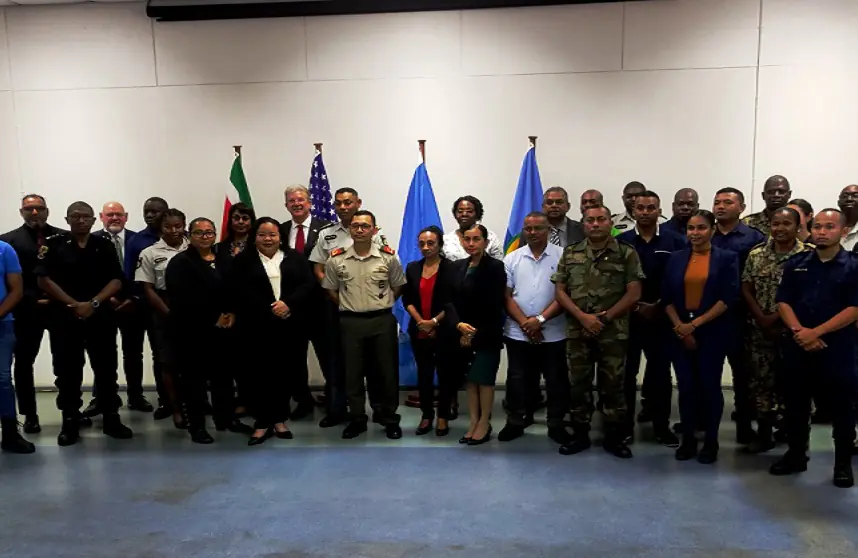CARICOM IMPACS AND US TO ENHANCE FORENSIC CAPACITY IN THE CARIBBEAN
The Caribbean Community (CARICOM) Implementation Agency for Crime and Security (IMPACS) in collaboration with the United States (US) Department of State’s Bureau of International Narcotics and Law Enforcement Affairs (INL) continues to build the forensic capacity of select Caribbean countries.
On 14 November 2024, the organisations handed over forensic equipment to support the Suriname Police Force (KPS) in solving firearms-related incidents and the prosecution of perpetrators. This follows the announced acquisition of similar equipment for the Guyana Police Force (GPF) in October 2024. It is expected that the equipment will enhance the forensic capacity of both the KPS and the GPF in analysing bullets, cartridge cases and firearms recovered from crime scenes or seized inland and at ports of entry.
The handover occurred during the CARICOM Crime Gun Intelligence Unit (CGIU) sensitisation and awareness workshop in Paramaribo, Suriname, which took place from 13 – 15 November 2024. Suriname is the fifth country to host this workshop and follows St. Kitts and Nevis, Barbados, Grenada and Guyana.
Speaking at the opening of the workshop, the Honourable Garcia Paragsingh, Attorney General, Suriname, expressed alarm at the use of firearms by criminals in the commission of crimes, the illegal possession and handling of firearms and ammunition. She lamented that while the Public Prosecutor’s Office (OM) has been able to successfully prosecute several cases of varying size and nature in this context, there were also perpetrators who have gone unpunished for the time being and cases that were yet to be solved.
Mrs. Parasingh said the OM was aware of the importance of targeted intelligence and technology in detecting and analysing illegal guns. “Gun intelligence allows us to work faster, more accurately and effectively, allowing us not only to identify perpetrators, but also to visualise trends and networks. Through use of innovative detection techniques and data analysis, we can detect where firearms will be used and take preventive measures,” she noted.
However, the Attorney General reiterated that cooperation is crucial in the fight against gun crimes. “It is indispensable here. This is a battle we cannot win alone. We need the commitment and dedication of everyone – from the police and judiciary to our international partners. Together, we are building a system where information is shared and utilised so that we can effectively combat firearms-related crime,” she explained.
Ms. Tonya Ayow, Deputy Executive Director, CARICOM IMPACS, shared Mrs. Parasingh’s sentiments and acknowledged that combatting firearms-related crimes requires a unified approach. “It is our shared commitment to not only maintain operational support but also to collaborate closely with our partners to enhance the capabilities and capacities of the Firearms Units within our Region,” she stated.
She cited the procurement of essential equipment for three beneficiary Member States to support the acquisition, comparison and correlation of ballistic exhibits, with the generous funding from partners including the US, and procured by CARICOM IMPACS as an example of such collaboration.
Ms. Ayow reiterated that combatting firearms-related crimes required a unified approach and restated CARICOM IMPACS’ commitment to not only maintain operational support but also to collaborate closely with partners to enhance the capabilities and capacities of the Firearms Units within the Region. The CGIU, with support from the US, has been working alongside US agencies such as ATF, Homeland Security Investigations (HSI), Customs and Border Protection (CBP) and the Bureau of Industry and Security (BIS) to support firearm-related investigations through the provision of relevant and actionable intelligence. She also took the opportunity to thank the US Government for their support of the CGIU.
Mr. Robert J. Faucher, US Ambassador to Suriname, noted that transnational criminal groups and drug traffickers continue to illicitly proliferate small arms and ammunition throughout the Caribbean, threatening security, undermining regional stability, and driving irregular migration. He assured that the US was working with its partners, regionally and bilaterally, to address the leading security concerns and create a more secure environment for businesses and investment in the CARICOM Region.
One such measure he explained was the changing of US policies relating to the exportation of firearms, with the goal of reducing the number of weapons in the region which were being diverted for use in crime. Additionally, the US has invested more than US$2 million to help CARICOM establish the CGIU.
“This workshop, as well as the equipment we are providing, will enable Suriname to participate actively in law enforcement cooperation and contribute valuable data to further law enforcement investigations,” he added.


